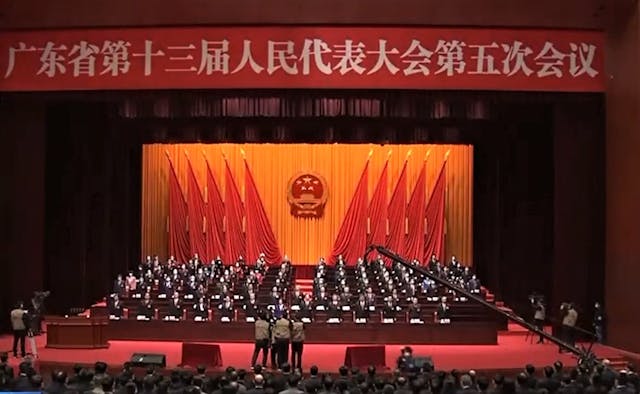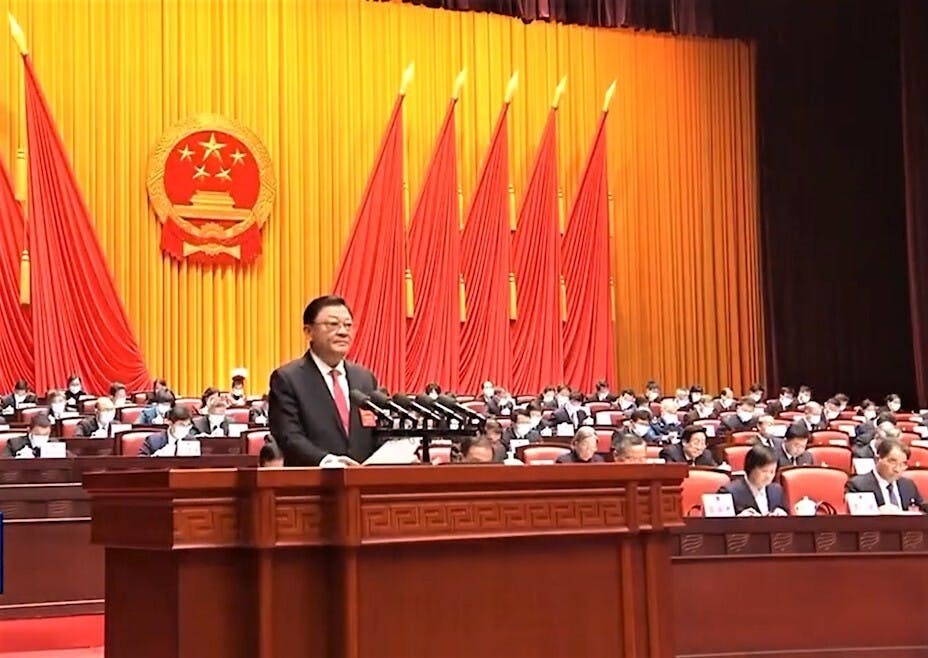1月20日,廣東省第十三屆人大五次會議在廣州市召開,在本屆會議上當選省長的代省長王偉中作了對港澳政策意義重大的報告。
去年粵省GDP增長8%
王偉中的報告肯定了廣東省在實現「十四五」規劃方面取得的巨大進展。2021 年,廣東的 GDP 增長了 8%,東莞市成為全省增長最快的城市之一。全省地方一般公共預算增長9.1%,進出口總額增長16.7%。社會和零售產品的公眾消費增長9.9%。金融業增加值突破1萬億元,全省實際利用外資1840億元。省重點項目完成投資逾1萬億元。全省建成5G基站約17萬個,其中新建基站4.67萬個。高新技術企業達6萬家。據統計,在新冠病毒及其變種的疫情延續下,廣東省在經濟發展方面取得了巨大而令人印象深刻的進步。
2022年廣東GDP增長目標預計增長5.5%,固定資產投資增長8%,社會消費品零售總額增長6.5%,進出口總額增長3%,規模以上工業增加值5.5%,地方一般公共預算收入增長5%,居民人均可支配收入與經濟增長基本同步,城鎮新增就業110萬人。假設新冠疫情對省級經濟增長的影響微乎其微,所有這些目標都是相當雄心勃勃的。

大灣區發展雄心勃勃
工作報告用了大量篇幅談及大灣區的發展,對香港和澳門產生的巨大政策性影響。首先是深化粵港澳大灣區交通工程和數碼化建設。其次是廣州至佛山、深圳至惠州的交通將通過城際鐵路得到改善。第三,大灣區建設現代化城鎮、鄉村和農業區。第四是深交所實施全市場註冊制度改革,開放廣深科技金融改革試驗區。第五是粵港澳大灣區將開展跨境資產和資本管理試點。第六是設立港澳保險服務中心,推進保險服務優質化理念。
對香港和澳門的直接影響是顯而易見的。港澳銀行業和保險業可以利用大灣區發展的黃金機遇,跨境為大灣區居民提供更多優質服務。如果兩地的社會福利機構和養老院與內地同行加強合作,香港和澳門的退休人士可能更容易接受在大灣區退休的想法。香港和澳門5G通訊的發展必須深化,才能趕上廣東的快速發展。因此,香港北部都會區的發展必須加快步伐,以趕上大灣區的巨大進步和發展規劃。
規劃前海橫琴與港澳對接
廣東省政府工作報告有相當篇幅提及横琴和前海兩個合作區的建設,澳門和香港在經濟融合過程中實現互利共贏,將發揮至關重要的作用。一是橫琴與澳門合作區將出台新條例及放寬市場准入特別措施、鼓勵類產業目錄、企業和個人所得稅優惠等政策。這對澳門的意義,是更多的澳門企業和個人將能夠從澳門─橫琴合作區的新法規中受益,從而使澳門能夠在一些戰略領域開展適當的經濟多元化,例如建立建設橫琴先進智能計算平台,發展中藥新藥技術創新中心等。
其次,大灣區將利用高速的城際鐵路與澳門輕軌交匯,造福澳門居民,帶動澳門青年在大灣區發展事業和事業。對澳門的具有雙重影響:澳門輕軌的路線需要更新,以與內地鐵路線匯合。此外,澳門的年輕人需要拓闊他們的知識面和專業知識,以便更加熟悉大灣區的環境,促進他們的就業和事業發展。因此,澳門政府或須成立專責小組,讓商界參與,接納青年團體,與本地大專院校商討如何讓青年更了解大灣區,並思考如何提供鼓勵澳門青年就業和發展新事業。這方面,澳門政府、商界和本地大專院校需要採取更積極的態度。
第三,報告提到,前海深港合作區將制定國土空間規劃,以及探索新型管理體制。對香港的啟示是,香港政府應與澳門政府一樣,理應成立一個由本地企業、青年團體、本地公立和私立大學組成的專責組織,以評估前海地區可以如何戰略性地幫助北部都會區共同發展。更好的城市規劃、戰略發展藍圖和拓展重點行業,將實現前海與北部都會區雙贏的局面。
促進深港澳人才交流
第四,廣東省政府工作報告提出,打造前海深港國際金融城、會展海洋城、國際人才港等平台,推進國際法律服務中心和國際商事爭議解決中心建設。對香港的影響是,香港政府的司法部門可能需要與法律界合作,看看香港在普通法應用和國際仲裁方面的優勢,如何有利於前海在司法方面的發展。
此外,如果前海要成為又一個在香港幫助下快速發展的主要城市,那麼北部都會區的基建項目,可能需要與前海當局協商和合作,以便前海深港合作區的交通網絡可以與香港對接,使之更容易吸引人才流動。同時,更多的香港公立和私立大學可能會考慮在前海設立分校,並獲得必要的支持性投資和內地的優惠待遇,特別是如果深港合作區渴望真正吸引國際人才在前海工作和居住。
廣東省政府工作報告對高新技術和創新發展雄心勃勃,包括加快建設河套、橫琴、廣州和南沙的高新技術中心。這些地方將爭取獲得國家級的實驗項目,包括生物安全實驗室,與港澳合作建設實驗實驗室。隨着廣東高校加快改革的實施,廣東省將深化應用研究。
廣東將推動全省高校與港澳高校開展合作,促進人才和研究人員的培養。對港澳高等教育界的啟示是顯而易見的:兩個特別行政區的公立和私立大學都應該在研究、教學和學習活動上加大投入,與內地同行建立更多的合作項目。預計粵港澳政府將扮演一種中間人的角色,以合作的方式將至少部分或全部高等教育機構聯繫起來,從而實現雙贏。
港澳規劃配合時機成熟
報告的其他領域包括廣東將如何實現鄉村現代化、深化農業和文化發展。文化發展方面,對香港和澳門都有影響。粵港澳三地將舉辦2025年全運會,對港澳的影響是兩地必須加強體育和文化政策。香港和澳門或許都忽略了制定和發表體育文化發展年度報告,培養更多的本地體育人才,提供更好的體育基礎設施,支持和改善兩個特別行政區的體育教育。
理想情況下,新一屆的香港和澳門立法會將以更深入、更全面的方式應對體育和文化發展。綜上所述,廣東省政府在廣東省人大會議上的報告,對港澳具有重大的政策意義。從粵港澳大灣區的快速發展而言,廣東省人大會議上的報告可謂面面俱到,港澳政府與相關的公私營機構和組織(銀行、保險、商業、青年、高等教育)以更全面的方式進行規劃,令粵港澳經濟社會融合,為所有利益相關者帶來雙贏局面的時機已經成熟。
The Work Report of Guangdong People’s Congress: Implications for Hong Kong and Macau
On January 20, the Guangdong province’s 13th People’s Congress was held in the city of Guangzhou where its acting provincial governor Wang Weizhong – who was elected governor during this session – delivered an important report with policy implications for Hong Kong and Macau.
His report affirmed the tremendous progress made by Guangdong in realizing the 14thfive-year plan. Guangdong’s GDP increased by 8 percent from 2020 to 2021, while the city of Dongguan became one of the fastest growing cities in the province. Budgetarily speaking, the local government’s revenues increased by 9 percent, whereas the amount of province’s imports and exports jumped by 16.7 percent. The public consumption on social and retail products rose by 9.9 percent. The value-added amount of all financial and monetary enterprises in the province was over 1 trillion yuan, while foreign investment in the province amounted to 184 billion yuan. The province also invested 1 trillion yuan in major infrastructure projects. About 170,000 5G stations were established in the province, including 46,700 new stations. The number of high-tech enterprises amounted to 60,000. Statistically, Guangdong showed immense and impressive progress in economic development amid the continuation of Covid-19 and its variants.
The target of Guangdong’s GDP growth in 2021 is expected to increase 5 percent, fixed asset investment 8 percent, social and retail consumption 6.5 percent, the total amount of imports and exports 3 percent, industrial and commercial value-added 5.5 percent, the public revenues of local government 5 percent, the residents’ consumption expenditure 3 percent, and the new employment in cities and towns is expected to rise by 1.1 million. All these targets are quite ambitious, assuming that Covid-19 will have minimal impact on the provincial growth.
The report gave considerable coverage on the development of the Greater Bay Area (GBA) with tremendous policy implications for Hong Kong and Macau. First, Guangdong is going to deepen the transport engineering work and digital establishment in the GBA. Second, the transport between Guangzhou and Foshan, and between Shenzhen and Huizhou is going to be improved by modern railway. Third, the GBA is going to have modernized towns, villages, and agricultural districts. Fourth, the Shenzhen stock exchange is going to undergo reforms in its market registration system, opening an experimental zone for Guangzhou-Shenzhen technological and monetary reforms. Fifth, the GBA is going to experiment with cross-boundary asset and capital management. Sixth, the Hong Kong and Macau insurance service centre will be set up, promoting the idea of delivering better insurance services.
The immediate implications for Hong Kong and Macau are clear. The banking industry and the insurance sectors of Hong Kong and Macau can make use of the golden opportunity of the GBA development, crossing their boundaries and offering more high-quality services for residents in the GBA. Retirees in Hong Kong and Macau may be more receptive to the idea of retiring in the GBA if the social welfare agencies and elderly homes in the two places forge greater cooperation with their counterparts in the mainland. The 5G development in Hong Kong and Macau must deepen to catch up with the fast progress in Guangdong. Hence, the development of the Northern Metropolis in Hong Kong must accelerate to catch up with the tremendous progress and developmental plans in the GBA.
The Guangdong report gave considerable coverage in the areas of Hengqin and Qianhai, where Macau and Hong Kong are playing a crucial role in achieving mutual benefits in the process of economic integration. First, Hengqin and Macau Cooperation Zone will witness new regulations to relax market entry and provide special preferential treatment, including the classification of new industries and the tax exemptions for enterprises and individual income. The implication here for Macau is that more Macau enterprises and individuals will be able to benefit from the new law and regulations from the Macau-Hengqin Cooperation Zone so that Macau will be able to launch its suitable economic diversification in some strategic areas, such as the establishment of a bond centre and the development of a Chinese medicine hub.
Second, the GBA is going to use high-speed and modern railway to converge with the Macau Light Rail, benefiting the Macau residents and stimulating the Macau youth to develop their business and careers in the GBA. The implications for Macau are twofold: the Macau Light Rail will need to be renewed in its routes to converge with the mainland railway lines. Moreover, the young people of Macau will need to develop their knowledge and expertise so that they are going to be more familiar with the GBA environment for their career and business development. As such, the government of Macau may have to establish a task force to engage the business sector, to embrace youth groups, to discuss with local tertiary institutions on how to equip the youth with better knowledge of the GBA, and to ponder how to provide incentives for the Macau youth to develop their new business and find employment there. A more proactive approach adopted by the Macau government, the business sector, and the local tertiary institutions will be necessary.
Third, the report mentions the Qianhai-Hong Kong Cooperation Zone will develop its blueprint for land and space usage, exploring a new management system. The implication for Hong Kong is that the Hong Kong government, as with its Macau counterpart, should ideally establish a task force composed of the local business enterprises, the youth groups, and local private and public universities to assess how the Qianhai region can and will be utilized strategically to benefit the co-development of the Northern Metropolis. Better urban planning, strategic developmental blueprint and focused sectoral expansion will achieve a win-win situation for both Qianhai and the Northern Metropolis.
Fourth, the Guangdong report points to the establishment of an international monetary and financial centre in Qianhai, together with a new convention and exhibition ocean centre, and a hub of attracting international talents. It is hoped that an international legal service centre and a centre for the resolution of international commercial disputes will be established. The implication for Hong Kong is that the legal authorities of the Hong Kong government may have to work with the local legal sector to see how Hong Kong’s strengths in the application of common law and international arbitration would benefit the Qianhai’s legal development. Moreover, if Qianhai is going to be another major city developing rapidly with the assistance from Hong Kong, then the infrastructure projects of the Northern Metropolis will perhaps have to consult and work with the Qianhai authorities so that the transport network in the Qianhai-Hong Kong Cooperation Zone will be interconnected and easily attract the movement of talents. Relatedly, more Hong Kong’s private and public universities may consider branch campuses in Qianhai with the necessary supportive investment and mainland’s preferential treatment, especially if the cooperation zone is keen to really attract international talents to work and reside there.
The high-tech innovative development of the Guangdong report is very ambitious, including the acceleration of the high-tech centres in Hetao, Hengqin, Guangzhou and Nansha. These places will try to acquire national experimental projects, including the laboratories for biological safety and the cooperation with Hong Kong and Macau to build up experimental laboratories. Applied research is going to be deepened in the Guangdong province, together with the implementation of the accelerated reforms undertaken in Guangdong’s higher education institutions. Guangdong is going to promote higher education institutions in the province to cooperate with the universities in Hong Kong and Macau so that a process of cultivating more talents and researchers will be facilitated. The implication for Hong Kong and Macau’s higher educations sector is obvious: all the public and private universities in the two special administrative regions should ideally invest more in their research, teaching and learning activities so that more collaborative projects with the mainland counterparts will be built up. The role of the governments of Guangdong Hong Kong and Macau will be expected to be a kind of middlemen, linking up at least some or all of these higher education institutions in the form of an alliance so that a win-win situation will take place.
Other areas of the report include how Guangdong is going to modernize villages and deepen agricultural as well as cultural development. The aspect of cultural development has implications for Hong Kong and Macau. As Guangdong, Hong Kong and Macau are going to organize the 2025 China’s Nation Games, the implications for Hong Kong and Macau are that both places must build up their sports and cultural policies. Both Hong Kong and Macau have perhaps neglected the development and publication of an annual report on sports and cultural development, training more local sports talents, providing better sports infrastructure support, and improving sports education in the two special administrative regions. Ideally, the new Legislative Councils of Hong Kong and Macau are going to tackle sports and cultural development in a much deeper and more comprehensive manner. In conclusion, the report delivered by the acting government of Guangdong during the Guangdong People’s Congress has tremendous policy implications for Hong Kong and Macau. Judging from the rapid development of the GBA, the comprehensive content of the Guangdong People’s Congress report, it is high time for the governments of Hong Kong and Macau and their related private-sector organisations (banking, insurance, business, youth, higher education) to adopt a more holistic approach to planning so that the Guangdong-Hong Kong-Macau socio-economic integration will bring about a win-win situation for all satchel.
原刊於澳門新聞通訊社(MNA)網站,本社獲作者授權轉載。




































